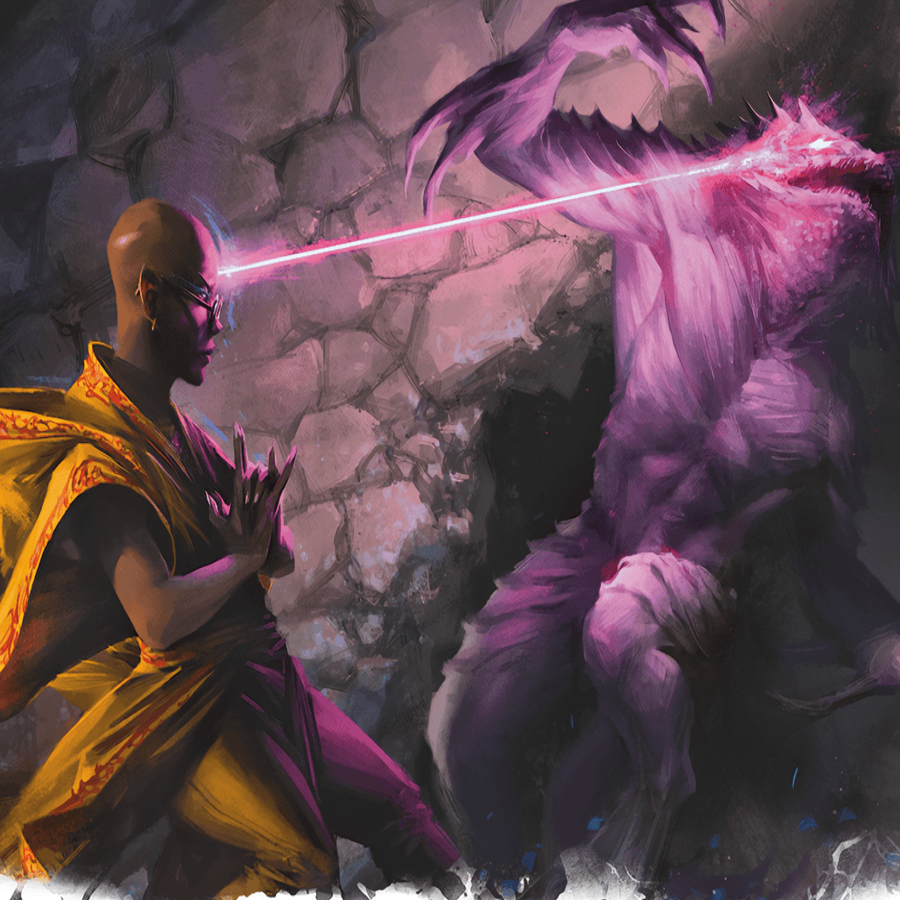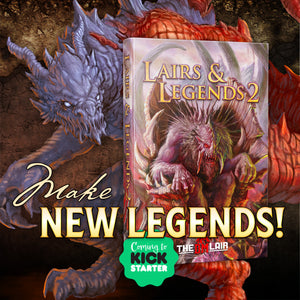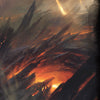7 House Rules for a Better D&D Game

Written by Luke Hart
Today, we’ll cover seven simple house rules that can improve your Dungeons and Dragons game. None of them are complex or complicated, and you should be able to implement them quite easily. I established this list by asking my players which of my house rules they liked the most.
By the way, running awesome 5e games with in-depth lore, deadly traps, and terrifying monsters doesn’t have to take hours of prep! Lairs & Legends 2 and Loot & Lore 2 have everything you need!
Hand-crafted by a team of professional game masters to make it as easy to use as possible, it’s an anthology of game master resources to fuel you for years to come. Never again feel like you’re stuck with the chore of prep so you can finally run your game: Pick up Lairs & Legends 2 today.
Watch or listen to this article by clicking the video below.
#1 Luck Points
I came up with luck points because I was a little dissatisfied with the Inspiration System in Dungeons and Dragons 5th edition. The problem with the inspiration system is, first of all, you can only have one at a time. I would constantly find that my players would save their inspiration for an important event, such as a boss fight. I would award my players inspiration, but they already had it, so they’d technically be earning it but never really getting their reward because they never used it.
The next problem with the inspiration system is that you must declare that you’re using it before you roll your d20, then roll with advantage. This causes you to potentially waste it if you would have rolled high anyway since the rules state that you don’t get to roll the die first, see if it’s high or low, and then decide to roll it again.
My luck point system replaces the inspiration system and fixes both problems. The way it works is you earn luck points for the same things you would normally earn inspiration for. So, if a player roleplays his personality trait or flaw, he will gain luck points. Then, I simply roll a d6, and that is the number of luck points the player earns. There is no limit to the amount of luck points you stockpile, so you can keep earning and stockpiling them until you have tons. And that’s perfectly fine. In fact, many of my players do that.
You can use luck points in two different ways. First, you can use them to increase or decrease your d20 rolls. I have no idea why you would want to decrease your own d20 rules, but it is possible. To increase or decrease your d20 roll, you spend luck points on a one-to-one basis. So, if I roll a 4 and spend 5 luck points, I can make it a 9. Or if I roll a 19 and spend 5 luck points, I can make it a 14.
The only caveat is that if you increase the total result to 20, it does not become a critical hit. You cannot create critical hits by using luck points in the same way you can’t create critical failures by using luck points.
The second way you can use luck points is to influence the d20 rolls of other players or the dungeon master. To do that, you spend luck points on a two-to-one basis. For instance, if another player rolls a 5, I can spend 4 luck points to increase it to 7. In other words, it will cost me 4 luck points to make an improvement of 2.
It works the same way against the dungeon master. I have yet to have a player use his luck points to influence my rolls, but I’m sure that when they finally do, they’ll get a big kick out of it.
#2 Tactics Discussions between Combat Rounds
Another thing I don’t like about Dungeons and Dragons is how long combat can take. In my opinion, the number one thing contributing to longer combat is that players discuss tactics throughout the combat before each player’s turn.
In other words, one player takes their turn, and then the entire table discusses what that player might do. That takes a while. Then it’s another player’s turn, and again, the entire table discusses the most optimal thing for that player to do. Again, that takes a while, and you rinse and repeat that throughout the entire combat. It takes forever!
I don’t allow my players to discuss tactics before each of their turns. Now, I’m not a jerk about it, but I don’t allow it. I enforce it as a kind of soft ban. However, I do recognize the need for players to discuss tactics during a combat, so I came up with a solution.
Between each combat round, I allow the players one minute to discuss the tactics they’ll use during the next round. So, the players will discuss: I’m going to cast fireball; you’re going to go over there and sneak attack that one person; you’re going to heal me, and so on.
They get one minute to do this, so when the combat round begins, everybody has a basic idea of their tactics for that round. It makes things go much faster, and it prevents the tactical discussions that would otherwise happen before each player’s turn.
You gotta trust me. That one-minute discussion between combat rounds will save you 10 or 15 minutes more than if you had allowed your players to discuss their actions before each player’s turn.
#3 Declaring Actions in Combat Quickly or Dodging
This house rule kind of goes hand-in-hand with the purpose of the previous house rule, which is to speed up combat. The way this works is that when I tell a player it’s their turn, they have about 5 or 10 seconds to tell me what they are doing. If they don’t respond, I start to put a little pressure on them. I say, “Hey, I need to know what you’re doing.”
But Luke, you may say, what if your players don’t like feeling pressured like that? What if you’re increasing their anxiety or something? To which I would respond, IT’S COMBAT. It should feel a little bit stressful. You should feel a little pressure. Now, I do it in a good-natured sort of way. I’m not trying to be a jerk. I’m not trying to give somebody an anxiety attack. And it’s done to make the combat go faster.
If the player doesn’t give me an action quickly enough, I declare that they’re dodging for that round. Then, they don’t get to do anything at all. They essentially lose their turn. Let me tell you something, once a player has lost their turn once or twice, they will 100% move faster the next time. No one wants to lose their turn in combat. It really sucks.
Some of you might think I’m coming across as a little harsh with this rule, and I might be. However, everyone has been in a game with a wizard, sorcerer, or a druid who cannot decide which spell to cast. The player then sits there for five minutes trying to decide, which drags the entire game down.
But Luke, you may say, spells are complicated, and choosing which one to cast is hard. To which I reply, yes, you’re right. That’s why you should be trying to figure that out during the other players’ turns. And you should be familiar with your own character and their spells. That way, you’re prepared for the game session and don’t punish everyone else because you can’t make a decision.
By the way, I created a new initiative system that I think helps with players who don’t know what they’re going to do on their turn. I don’t think it’s 100% unique to me; I probably stole some ideas from others. But I feel that it works well and does what I want it to do.
#4 Secret Death Saving Throw Checks
OK. We’ve all been there. One of the PCs goes down and is at 0 hit points. Let’s say it’s the paladin (because we all love paladins), and the player rolls a death check and passes. So the rest of the players are like, no big deal, we might wait around or two to go over and heal him. Then, the paladin passes the death check again during the next round. That’s two passes and zero failures. At this point, the other players aren’t sweating it at all; they can take their time. There are no worries about healing that paladin because he is in no danger of dying.
Of course, what we have going on in this situation is metagaming. The characters don’t know that the paladin is OK. The players, however, do understand that the paladin is in no danger of dying, and thus, there is no urgency to heal him. So, I came up with a very simple thing that prevents the players from metagaming in this manner.
I, the dungeon master, roll the death checks when a player’s character is at 0 hit points. I do so secretly behind my screen, and I tell no one what I rolled. In fact, I will make sounds and faces that throw the players off if they’re trying to guess. This way, the players have no idea if the paladin succeeded or failed on his death check.
Not only does this prevent metagaming, but it also adds a sense of drama and urgency when a player’s character goes down to 0 hit points. The other players are now worried that the paladin might die, and they have their characters try to get over as quickly as possible to heal him.
I feel that this small change facilitates roleplaying so much better than if the death checks were ruled by the players. It also makes this situation much more exciting and dramatic for the players.
The only thing I want to mention about this technique is to play it straight. Do not fudge the death checks. Don’t use this secret rolling of death checks to bring the characters back to life. Nor should you use it to kill them. Rule straight and play it straight, dungeon masters.
#5 My d12 Random Encounter System
I love random encounters. Almost every time my players take a short or long rest or travel somewhere, I have them roll for random encounters. On a short rest, one player rolls a d12 to determine if a random encounter happens; on a long rest, two players roll a d12 to determine if a random encounter happens. Also, for each day of travel, one player rolls a d12 to determine if a random encounter happens.
A random encounter occurs not based on the player’s d12 roll alone; instead, the dungeon master also rolls a d12 behind their screen. If the number the player rolls matches the DM’s roll—for instance, if both roll sixes—then a random encounter happens.
This is why I like this system. It gives the dungeon master complete control over whether a random encounter happens. You see, sometimes, during a game, you absolutely do not want a random encounter to happen. You may have some goals for that game session or things that need to get done. You might sense that your players really just want to get to the next dungeon and start running it. In those situations, even if a random encounter comes up based on the dice results, I ignore it.
On the same token, there are times when you want a random encounter. For instance, you might need to delay them from getting to the next dungeon because you haven’t had a chance to plan it yet. Or, you might have planned a super cool random encounter for them on their way to the dungeon. In those instances, you simply ignore the dice results and have a random encounter happen.
Now, I am not suggesting that you always ignore the dice and do whatever you want. I also like to follow what the dice say and then roll up a random encounter, usually with Kobold Fight Club. All I’m saying is that this system gives you the freedom to ignore the dice when you want or need to.
Now, you might say, but Luke, you can do the exact same thing by just rolling one d12 yourself behind your screen. And you are 100% correct. However, I use this system because it makes my players feel they are involved in whether or not a random encounter actually happens—sometimes they are, and sometimes they aren’t. It’s all smoke and mirrors, like most things a dungeon master does.
#6 Drinking a Healing Potion with a Bonus Action
I don’t think this is a unique house rule. I’m pretty sure other dungeon masters do it this way, too. The way I do it is that when you drink a healing potion, you can use a bonus action to do so. Drinking any other type of potion costs an action just like the normal rules say it does, and administering a healing potion to someone else also takes an action.
I like to do it this way because I roll lots of big nasty creatures at my players. I want them to have easy access to healing during combat. Allowing them to drink healing potions with a bonus action lets them continue fighting as they heal. If they have to use their action to drink a healing potion, they lose the ability to fight at the same time.
The way 5th edition rules are made, if you start using your action to drink healing potions instead of attacking the enemy, you are in big, big trouble. The enemy can almost assuredly deal more damage per round than you can heal per round by drinking healing potions; it is a death spiral.
Allowing my players to drink healing potions with a bonus action fixes this death spiral and allows me to throw a lot of big nasties at them in combat. And I don’t have to worry quite so much about their ability to stay in the fight, keep fighting, and not go down.
#7 Settling Rules Discussions with a Dice-Off
This happens at every single Dungeons and Dragons game table: There is a question about a rule, then the player and the dungeon master start to discuss it. This discussion can sometimes turn into a debate, looking up rules in the books, and even checking to see if Jeremy Crawford has tweeted about this particular rule question.
This can bring your entire game to a grinding halt, so I have a very simple solution. The player and I have a quick discussion about the rule—quick being the important part. And I should say, too, that they usually involve all of the players to see what everybody thinks about the rule in question.
At that point, if we have not collectively decided the proper ruling, or if I disagree with what the player thinks the rule should be, we have a dice-off. The player rolls a d12, and I roll a d12. Whoever’s d12 is higher gets his way for the game session.
When we go offline after the game, I will investigate that rule further and figure out what makes the most sense for our game. I will then let my players know how we’re going to run it going forward, but this happens outside of the game so it is not stopping our gameplay.
Over 600 Pages of 5e Game Master Resources!
Running awesome games with in-depth lore, deadly traps, and terrifying monsters doesn’t have to take hours of prep! Lairs & Legends 2 and Loot & Lore 2 have everything you need to cut your prep time in half while preserving your campaign and your story! These two massive tomes are designed to let you plug-and-play encounters, monsters, magic items, brain-burning puzzles, and more easily into your game!
Or perhaps you just need that one really cool thing for your game, but it’s just not coming to you?
Both books contain hundreds of pages of 5e game master resources, carefully crafted by a team of expert game masters to be both exciting to run and easy to use. You don’t need to parse through dense paragraphs trying to find something useful; just take a quick glance through it and you’ll have everything you need at your fingertips.
Never again feel like you’re stuck with the chore of prep so you can finally run your game: pick up Lairs & Legends 2 today.
-
Posted in
Game Master How-To Articles






